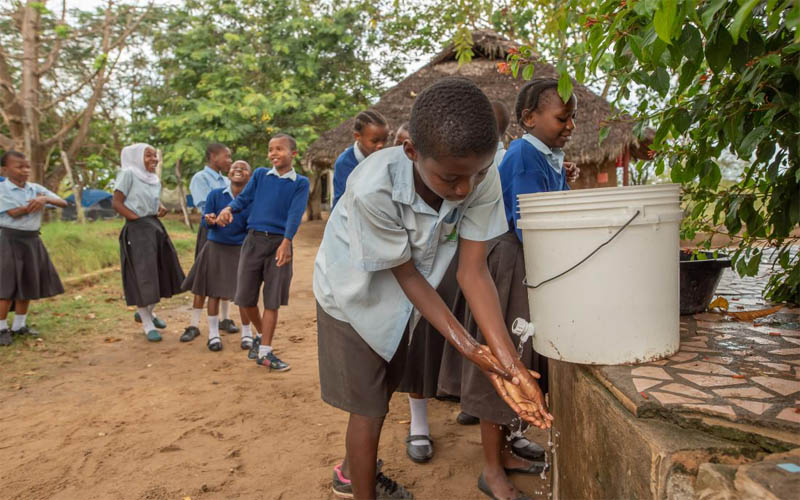+234 912 443 7374

Access to safe water, adequate sanitation facilities, and proper hygiene practices are crucial for creating a conducive learning environment in schools. Unfortunately, many schools around the world lack these essential WASH (Water, Sanitation, and Hygiene) services, putting the health and education of millions of children at risk. In this article, we highlight the importance of WASH in schools and advocate for its prioritization to ensure the well-being and development of students.
WASH facilities in schools play a vital role in preventing the spread of diseases. Access to clean water and handwashing facilities promotes good hygiene practices among students, reducing the transmission of illnesses such as diarrhea, respiratory infections, and parasitic diseases. Proper sanitation facilities, including functional toilets, help maintain a hygienic environment, further protecting students' health.
Adequate WASH infrastructure positively impacts academic performance. When children have access to clean water and sanitation facilities, they are less likely to miss school due to preventable illnesses. Improved health and hygiene contribute to better concentration, attendance, and overall educational outcomes. WASH interventions create an environment where students can thrive and reach their full potential.
Girls face unique challenges related to WASH in schools. The availability of separate, safe, and private sanitation facilities is essential to ensure their comfort and dignity. When girls have access to suitable toilets and menstrual hygiene management facilities, they are more likely to attend school regularly, without fear or discomfort, empowering them to pursue education and break gender barriers.
Integrating WASH education into the school curriculum fosters behavior change that extends beyond the school premises. Students become agents of change, advocating for hygiene practices within their families and communities. Promoting handwashing, proper waste management, and water conservation through education empowers children to adopt lifelong healthy habits.
Investing in WASH in schools aligns with the United Nations Sustainable Development Goals (SDGs). It contributes to achieving SDG 4 (Quality Education), SDG 6 (Clean Water and Sanitation), and SDG 3 (Good Health and Well-being). By ensuring access to WASH services in schools, we not only promote education but also support community development and the overall well-being of future generations.
Infrastructure Development: Governments, NGOs, and stakeholders must collaborate to improve infrastructure by constructing and maintaining functional toilets, handwashing stations, and safe water sources in schools. Facilities should be gender-sensitive, accessible, and designed to accommodate students with disabilities.
Integrating WASH education into the school curriculum is essential. Students should receive age-appropriate, comprehensive education on handwashing, menstrual hygiene management, proper sanitation practices, and water conservation. Engaging teachers, parents, and the broader community in promoting WASH practices strengthens the impact.
Ensuring the sustainability of WASH facilities requires proper operation and maintenance systems. Schools should have protocols for regular cleaning, repairs, and access to essential supplies such as soap and sanitation materials. Involving students in maintenance activities fosters a sense of responsibility and ownership.
Regular monitoring and evaluation help assess the effectiveness of WASH interventions in schools. Data collection on water quality, facility usage, student attendance, and hygiene behavior provides insights for evidence-based decision-making, allowing for continuous improvement and accountability.
Water, sanitation, and hygiene (WASH) in schools are integral components of quality education and overall child development. By prioritizing WASH services, we create healthier learning environments

Executive Director, Rural Water Access Foundation (RUWAF).
James Joeseph
01 Jan 2023 at 12:00pmKudos to the NGO for their exceptional WASH projects! Their commitment to providing clean water, sanitation, and hygiene resources is truly making a positive impact on communities in need. Keep up the amazing work!
ReplyAbel Samuel
03 Jan 2023 at 09:39pm
I'm truly impressed by the NGO's WASH projects. Their dedication to improving access to clean water and promoting hygiene practices is transforming lives and creating a healthier future for communities. Thank you for your outstanding efforts!
ReplyPhillip Canon
07 Jan 2023 at 07:51pm
The NGO's WASH projects are truly commendable. Their holistic approach, from providing clean water sources to promoting sanitation and hygiene education, is empowering communities and fostering sustainable change. Hats off to the NGO for their incredible work!
Reply